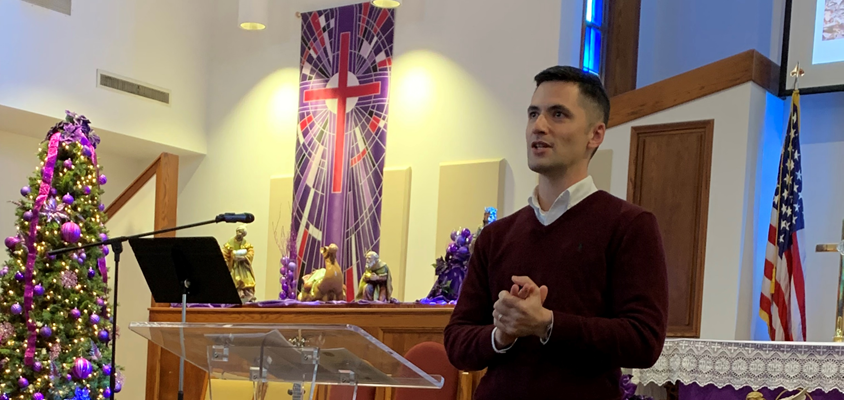This past Sunday Becky and I worshiped with the congregation at Spirit Chapel at Whiteman Air Force Base where our son Christopher in one of the chaplains. Christopher was preacher of the day. For you strict church and state separationists, don’t worry the Department of Defense is not endorsing Christian doctrine in the name of the chapel. It has more to do with the B-2 Spirit bombers based at Whiteman than with the Third Person of the Holy Trinity.
Sitting between us in the pew as we worshiped was our 11-year-old grandson Caleb. That itself was a great joy. Then one of the songs in the opening set was “Ten Thousand Reasons.” First published in 2011, “Ten Thousand Reasons” is an oldie but goodie in the world of Contemporary Christian Music. We sang it a lot back in the day. Our best memories of “Ten Thousand Reasons,” though, are not just from the ways it led us in worship, but that it was Caleb’s favorite song when he was two and three years old. How precious those moments when we knew nap time was over as we heard little Caleb, still in his crib, belting out “Bless the Lord, O my soul, O my soul/Worship His holy name/Sing like never before, O my soul/I’ll worship Your holy name.”
As we joined the Spirit Chapel congregation singing “For all Your goodness, I will keep on singing/Ten thousand reasons for my heart to find,” both Becky and I found our eyes misting. Surely our children, children-in-law, and grandchildren are near the top of the list of ten thousand reasons for our hearts to find.
There is something good and right about the joy that is found in our season of life. Children and grandchildren who cause us to keep on singing of God’s great goodness and kind heart.
I thought of the joy of worshipping with Caleb between us on the pew as I reflected on a recent New York Times article, To Breed or not to Breed (it may be behind a paywall). The piece revisits the phenomenon of women and couples opting out of parenthood for fear of the world in which their children will live. The current twist on the story has to do mostly with the prospect of climate change and the hardships it may bring.
My concern is not the fear-mongering and denial around the reality of climate change, so much as it is about how fear and denial rob us of joy.
Marriage and child bearing are normative and good according to Scripture. For a variety of reasons, though, some people do not get married and others do not become parents. The Apostle Paul commends the single life to some of his readers and the Lord Jesus was neither a husband nor a father.
But breeding, as the headline puts it, is more than one of many life-style options. Parenting is good and children are to be desired, valued, and nurtured as part of God’s purpose for his human creatures. Amazingly, God’s plan for all creation (see Romans 8) requires the birth of children and their growing to full and productive adulthood.
One of the vignettes in the Times story tells us about a 36-year-old Canadian woman who has chosen not to have children. We are told “her decision to remain childless in a world threatened by climate change springs from a protective instinct. ‘Harnessing the love I have for my unborn hypothetical kid comforts me in sparing them an inhospitable future,’ she said. ‘In this way, my choice feels like an act of love.’”
Our world, threatened by greed, injustice, and over-consumption, is not a hypothetical world, however. There is no such thing as a hypothetical kid.
Matthew and Luke tell the story of the birth of Jesus, the story of the incarnation of the Second Person of the Trinity. There is nothing hypothetical about the story of a manger bed and shepherds keeping watch over their flocks by night. And there was nothing safe or predictable about life and prospects for the future in Roman-occupied Judea.
Advent reminds us of how God breaks into history through the birth of a baby, a real baby. In the creed we confess not a hypothetical resurrection of the dead, but the promise of our resurrection to eternal life by the power of the death and rising again of the One who began life as Bethlehem’s baby, the Beloved Son of the Father, yet nurtured and raised to adulthood by real human parents.
Saints known by name and those anonymous saints known only to God whose stories fill the halls of history and whose lives still fill our world, did not and do not live hypothetical lives. Children are always born in uncertain times and always face an inhospitable future. Yet God will use children of the covenant born in times of uncertainty and fear to work for justice, advocate for love, and witness to joy even as we wait with patience and hope the second Advent and the coming of a new creation when God “himself will wipe away every tear from our eyes, and death shall be no more, neither shall there be mourning, nor crying, nor pain anymore, for the former things have passed away.”
In the meantime, children and grandchildren are a great reason for our hearts to sing his praise.

